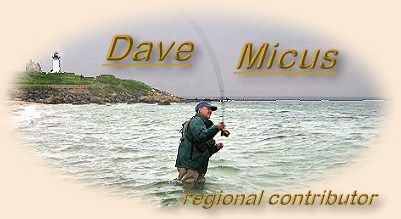|
Agonia is s term coined by Christian
monk and aesthete Thomas Merton to describe the fact
that man, alone among God's creatures, realizes
that this wonderful gift of life has to end. New
England striped bass fishermen well understand the
concept of Agonia. Stripers are a
migratory fish, traveling from the Hudson or Chesapeake
up the New England coast in the spring, only to reverse
their path and head back in the fall. Come late October,
the waters of Northern New England are devoid of bass.
But the fish gods are nothing if not just, and as
consolation for 6 fishless months, they have blessed
us New England salts with the fall blitz. The bass,
gorging on bait for their long trip south, appear
in great number and in great sizes along the shore,
and if you manage to time it right the fishing can
be stunning. Last year, for instance, on the beaches
of Gloucester and Beverly and Manchester by the Sea,
the greatest blitz of striped bass seen in 40 years
took place. The schools were huge, fishermen were
getting a fish on every cast, and anglers took up
to 100 fish. Most impressive was the size of the
bass, with many stripers in the 30's and 40's taken.
And I missed it. Taking no chances this year, I took
a week off in mid-October with the intention of fishing
from dawn until dusk, filling up on bass just as they
fill up on bait to get me through the long, cold winter.
Day One: I had a good report that
the bass were biting down on Cape Cod, but decided
to stay local the first day, thinking that, if the
fishing was poor, I could head to the Cape on the
morrow, and if the fishing was good I'd save myself
a 2.5 hour drive (each way). Besides, I really don't
like to travel to fish, as, for some reason, I
usually go fishless and why drive for 5 hours to
get skunked when I can do that within 15 minutes
of my house? But I would have to travel some, as,
in the fall, the bass tend to follow the ocean-edge
surf and not travel up into the sounds and estuaries
that I usually fish.
The north shore oceanfront is, no surprise, an
affluent enclave that strives to keep the riff
raff out. Massachusetts has an interesting law
from colonial times that cedes the owners of
ocean front property the land out to the low
tide water mark. This was to encourage owners
of waterfront property to build docks and piers
and increase commerce, but now has the effect
of waterfront property owners thinking they own
the ocean, and they post 'no trespassing' and
'private beach' signs everywhere in an effort to
prove it. But though this law remains in effect,
it is mitigated by another statute that permits
public access to the high water mark for the
purpose of 'fishing and fowling.' Property owners
seek to circumvent this loophole by having the
entire area around these beaches posted 'no parking,'
but, fortunately, the local police relate more
to the economic status of fishermen than millionaires,
and during the fall ignore the illegally parked cars.
But today it wouldn't have mattered if I had been run
off by shotgun wielding landowners, as all I had to
show from their private beaches was one medium sized
striper. And I was the lucky one, as the six or so
fly fishers and surfcasters within sight went fishless.
Tomorrow, it would be Cape Cod.

That evening I received a call from Richard Khan, a
quintessential bass bum who has been fly fishing for
stripers for about 40 years, long before many even
thought that you could take a striper on the fly.
Khan, as he prefers to be called, is one of the more
colorful characters who haunt the north shore of
Massachusetts in the quest for striped bass. He
is a trained chef, and he tells how, years before
as a young turk, he, Jasper White, and Julia Child
would gather in his Cambridge apartment and argue
over how to turn the culinary world on its ear.
He was also a professional opera singer, and one
only has to hear his sonorous voice to visualize
him on stage as Rodolfo in Le Boheme.
Retired now, he brings the same artistry and passion
to his quest for striped bass, and once caught a
48-inch striper while fishing off of the rocks in
Magnolia. I told Khan about my almost fishless
morning. "You were there too late," he confided.
"The beach was loaded with fish from 5 AM until 7,"
or, typically, the time I arrived. This gave me
the excuse I needed not to drive down to the Cape,
and we planned to meet on one of the north shore
beaches at first light.
Day 2: I arrived at Singing Beach
in Manchester at 5am, and had the beach to myself.
The surf was a good bit rougher than yesterday, but
I worked my way out past where the waves were breaking,
or so I thought, and began to cast. In the purple/red
light of false dawn I saw a large wave bearing down
on me, about shoulder high, so as it hit I hopped
into the air to take the wave on the chest. But
the backwash from a previous wave swept my feet
out from under me, and I went down like a wide
receiver caught in the air by Brian Urlacher. I
scrambled to my feet but the damage was done.
It would be a long cold morning. Adding insult
to injury, I took only one fish. It was time to
move.

Route 127 is to the striped bass angler what
the Strip is to the Vegas gambler. Route 127
runs parallel to the shore, and off of this
road are many of the best fishing spots that
the north shore has to offer: Singing Beach;
Black Beach; White Beach, Long Beach, Lobster
Cove, West Beach, Magnolia Beach, Breckenridge
Beach, and other, more obscure places that I've
promised not to mention (one of which being the
spot where Khan caught his four-foot bass).
Much of it is, conveniently, sight fishing from
your car. You ride past a beach, look for gulls
diving and bass slashing, and, if nothing is in
sight, you move on to the next location. I
hadn't driven far when I spotted a small blitz,
and I ignored the no parking and private beach
signs, waded waist deep, and caught a striper
on the first cast.
I was the only angler on the beach, but not for
long. Striper fishermen are like the gulls -- both
seem to materialize out of thin air when the fish
start blitzing. Soon there were ten fly fishers
on the beach, one of which was Khan, and we all
managed to hook up before the bass, following the
bait, moved on. So it was back to 127. Now we
had a small caravan; Matt, another striped bass
aficionado, Khan and myself. Our collective gear
was likely worth more than our collective cars,
which made no difference; we saw no more feeding
fish and, still chilled from my unwanted baptism,
I decided to head for home.
Day 3: I toy with the idea of going
to the Cape, but it is Saturday of a holiday weekend
and I decide not to risk the traffic and crowds.
Five months of getting up at 5 am to work and fish
(not in that order) finally catches up with me, and
I forgo fishing and sleep in. I curse myself the
entire day for being soft.
Day 4: It's back up at 5 and off
for the coast. Again a brief frenzy at one of
the beaches, fishermen materializing like phantoms,
and five fish, bam bam bam, before it ends. I
cruise 127 in search of gulls and fish, see neither,
and head for home.
Day 5: I meet Matt and we work five
or six beaches. We each take a fish blind casting,
but the action is slow, particularly for this time
of year. Where can they be? Nearly everyone I talk
to on the north shore says this is one of the worst
fishing years in recent memory, and I agree, though
it comes as a surprise seeing the reports I had been
getting from New Jersey, Rhode Island, and Cape Cod.
It seems as if the bass just never made it as far as
the north shore in any great numbers, particularly
disappointing when on the verge of a six fishless
months. But though it's slow, I'm buoyed by the
fact that I'm off tomorrow, a weekday, and I'll
salvage this week by heading down to Cape Cod and
catching my limit. As I sleep, linesiders whirl
through my dreams.
Day 6: I get up early for no reason.
A Nor'easter, the remnants of a tropical storm whose
name I forget, is raging outside. I check the
weather map on the net and the weather on the Cape
is even worse. The rain I can handle, but the wind
gusts will take a 50-foot cast and return 40 feet
of it, and I decide not to drive 2.5 hours to deal
with that. I take a short ride and see that the
Ipswich lobster fleet have left their moorings
and taken safe harbor at the town wharf, a more
dependable predictor of bad weather than any
N.O.A.A. forecast.

Back home, I break down the strung up rod and clean
it, strip the line off of the reel and clean it,
too, and am considering stowing all of my gear
for the off season, then don't. Saturday is
only four days away. I wind the line back
on the reel and string up the rod.
The fish gods might smile on me yet. ~ Dave
About Dave:
 Dave Micus lives in Ipswich, Massachusetts. He is an
avid striped bass fly fisherman, writer and instructor.
He writes a fly fishing column for the Port City Planet
newspaper of Newburyport, MA (home of Plum Island and Joppa Flats)
and teaches a fly fishing course at Boston University.
Dave Micus lives in Ipswich, Massachusetts. He is an
avid striped bass fly fisherman, writer and instructor.
He writes a fly fishing column for the Port City Planet
newspaper of Newburyport, MA (home of Plum Island and Joppa Flats)
and teaches a fly fishing course at Boston University.
|









